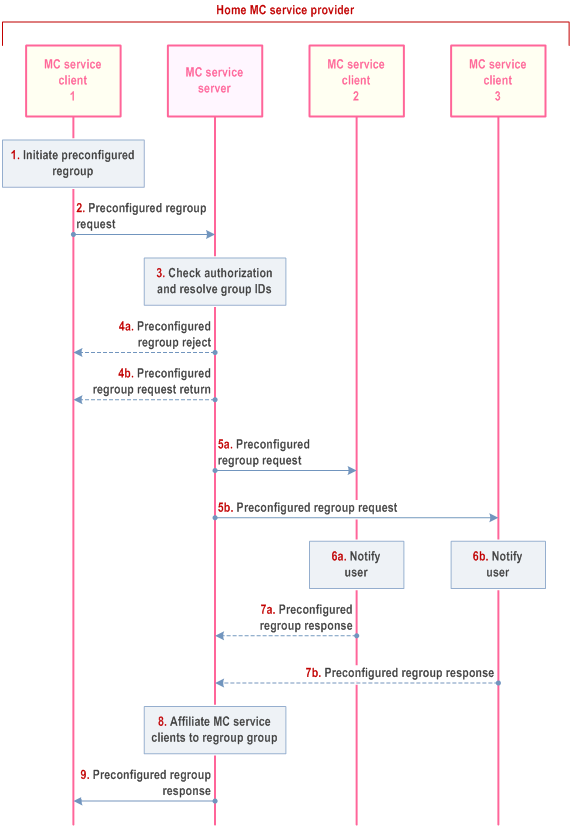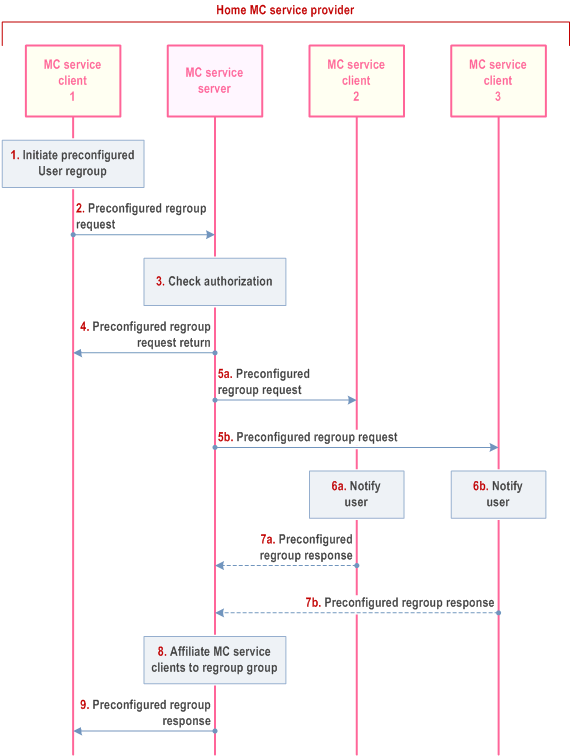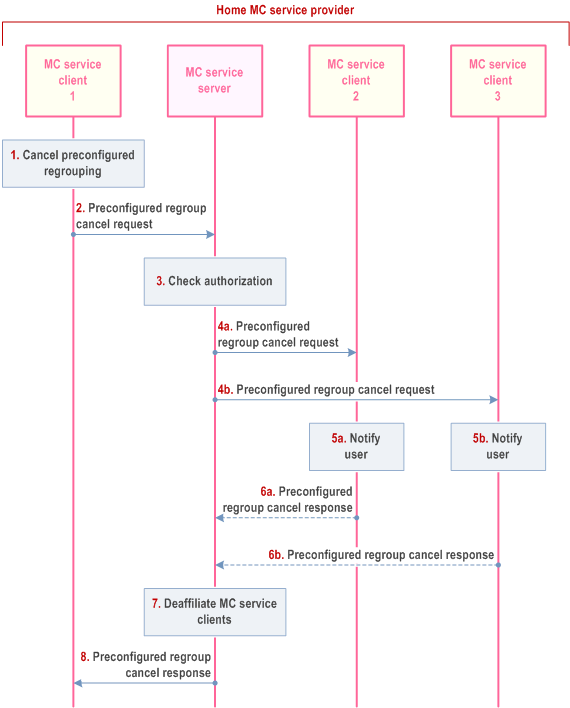Content for TS 23.280 Word version: 19.3.1
1…
5…
5.2.8…
6
7…
7.3.2
7.4…
7.4.3…
7.5…
8…
9…
9.2.2…
9.2.2.2…
9.3…
10…
10.1.2…
10.1.3…
10.1.4.3…
10.1.4.5…
10.1.5…
10.1.6…
10.2…
10.2.3…
10.2.4.2…
10.2.4.3…
10.2.5…
10.2.7…
10.3…
10.6…
10.7…
10.7.3…
10.7.3.4…
10.7.3.7…
10.7.3.7.3
10.7.3.8…
10.7.3.10…
10.8…
10.8.4…
10.8.5…
10.9…
10.9.3…
10.9.3.5…
10.9.3.8…
10.9.3.9…
10.9.3.9.3…
10.9.3.9.4…
10.9.3.10…
10.9.3.10.4…
10.9.3.10.6…
10.10…
10.10.1.2.3…
10.10.2…
10.10.3…
10.10.3.3…
10.10.3.4…
10.11…
10.11.5…
10.12…
10.13…
10.13.3…
10.13.7…
10.13.10…
10.14…
10.15…
10.15.3…
10.15.3.3…
10.15.3.4…
10.16…
10.17…
10.17.3…
10.17.5…
11…
11.3…
11.5…
11.5.2…
11.5.3…
11.5.3.3.2A…
A…
B…
C…
E…
10.15.3 Regroup with preconfigured group
10.15.3.1 General
10.15.3.2 Preconfigured regroup procedures in a single MC system
10.15.3.2.1 Preconfigured Group Regroup formation in a single MC system
10.15.3.2.2 Preconfigured User Regroup formation in a single MC system
10.15.3.2.3 Preconfigured regroup cancellation in a single MC system
...
...
10.15.3 Regroup with preconfigured group p. 287
10.15.3.1 General p. 287
A group regroup may be achieved by regrouping MC service groups into a new MC service regroup group which uses the configuration of a separate preconfigured MC service group. The MC service regroup group configuration needs to be provided to the relevant MC service group members of the MC service groups that will be regrouped in advance of the regrouping operation.
A user regroup may be achieved by regrouping MC service users into a new MC service regroup group which uses the configuration of a separate preconfigured MC service group. The MC service regroup group configuration needs to be provided to the relevant MC service users who will be regrouped in advance of the regrouping operation.
The preconfigured MC service group that provides the configuration is not used as the MC service regroup group itself, it only provides configuration for one or more MC service regroup groups. The MC service group ID of the regroup group is provided by the authorized user when the preconfigured regrouping is carried out.
The MC service regroup group can be specified to be a broadcast or non-broadcast type according to the configuration of the MC service group whose configuration is specified by the regroup request. The broadcast type of regroup is used for one-way communication where only an authorized MC service user is allowed to transmit and all other regroup members are only allowed to receive the communication (e.g. a call from a dispatcher to all regroup members). The non-broadcast type is used for two-way communication where all regroup members can transmit and receive (i.e, the regroup group call behaves like a normal non-broadcast group call).
For group regrouping, if the MC service server has been notified by the group management server that one of the MC service groups that has been requested for regrouping by means of these procedures has already been regrouped, the MC service server shall reject the request for regrouping described in the following procedures.
10.15.3.2 Preconfigured regroup procedures in a single MC system p. 287
The following subclauses define group and user regroup procedures using preconfigured groups within a single MC system.
10.15.3.2.1 Preconfigured Group Regroup formation in a single MC system p. 288
Figure 10.15.3.2.1-1 illustrates the procedure to initiate a group regroup using a preconfigured MC service group. The procedure takes place prior to the establishment of a group call to the MC service regroup group.
Pre-conditions:
- MC service client 2 is an affiliated member of MC service group 1 and MC service client 3 is an affiliated member of MC service group 2.
- The MC service group identity and group configuration for the preconfigured MC service group have been preconfigured in MC service clients 2 and 3, and MC service clients 2 and 3 have received the relevant security related information to allow them to communicate in the MC service regroup group.
- MC service client 1 is authorized to initiate a preconfigured group regroup procedure.
- MC service client 1 is aware of a suitable preconfigured MC service group whose configuration has been preconfigured in the MC service UEs of the group members who will be regrouped.
- In order to be aware whether a group is currently regrouped, the MC service server is subscribed to the group configuration in the GMS.
- The GMS has subscribed to group dynamic data from the MC service server using the procedures defined in subclause 10.1.5.6.

Step 1.
After the group regrouping procedure, the regrouping remains in effect until explicitly cancelled by the procedure in clause 10.15.3.2.3.
MC service client participation in the ongoing regroup persists until the MC service client is no longer affiliated to any of the regrouped groups (group 1 or 2 in this procedure).
MC service client affiliation to the regroup group may cease when the UE's MC service ceases, e.g. when the UE is powered down, or by performing a log-off operation.
The authorized user of MC service client 1 initiates the group regroup procedure, specifying the list of MC service groups to be regrouped (MC service groups 1 and 2), the MC service group ID of the regroup group (if available) and the MC service group ID of the group from which configuration information for the regroup group is to be taken.
Step 2.
MC service client 1 sends the preconfigured regroup request to the MC service server.
Step 3.
The MC service server checks that MC service client 1 is authorized to initiate a preconfigured group regroup procedure, and resolves the group identities of the MC service groups requested in step 1. The MC service server also checks which group members are affiliated to MC service groups 1 and 2. The MC service server may retrieve the configuration for the regroup group from the GMS if that configuration information is not already known to the MC service server. The MC service server also checks that none of the MC service groups that are requested for regrouping are already regrouped by any mechanism. If the preconfigured regroup request is authorized, the MC service server assigns a MC service group ID for this regroup group if:
Step 4a.
- one is not provided in the request or
- the one provided in the request is not accepted.
If the MC service server determines that any of the groups requested for regrouping, including the regroup group, have been regrouped by other group regrouping procedures, the MC service server then sends a preconfigured regroup reject back to MC service client 1 with a reject reason indicating that one of the groups has already been regrouped, and this procedure terminates.
Step 4b.
The MC service server shall send the preconfigured regroup request return message to MC service client 1 containing the below:
Step 5.
- result of whether the preconfigured regroup is authorized or not; and
- the MC service group ID if authorized
If the preconfigured regroup request is not authorized, MC service client 1 shall not proceed with the rest of the steps and this procedure terminates.
Step 5a/b.
The MC service server sends the preconfigured regroup requests to MC service clients 2 and 3.
Step 6a/b.
MC service clients 2 and 3 notify their users of the regrouping.
Step 7a/b.
MC service clients 2 and 3 may send the preconfigured regroup response to the MC service server to acknowledge the regrouping action. These acknowledgements are not sent in response to a multicast transmission of the preconfigured regroup request.
Step 8.
The MC service server affiliates the regrouped MC service clients to the regroup group.
Step 9.
The MC service server sends a preconfigured regroup response to MC service client 1.
10.15.3.2.2 Preconfigured User Regroup formation in a single MC system p. 290
Figure 10.15.3.2.2-1 illustrates the procedure to initiate a user regroup procedure using a preconfigured MC service group. The procedure takes place prior to the establishment of a group call to the MC service regroup group.
Pre-conditions:
- MC service clients 2 and 3 are registered with the MC service server.
- The preconfigured MC service group have been preconfigured in MC service clients 2 and 3, and MC service clients 2 and 3 have received the relevant security related information to allow them to communicate in the MC service user regroup group.
- MC service client 1 is authorized to initiate a user regroup using the preconfigured user regroup procedure.
- MC service client 1 is aware of a suitable preconfigured MC service group whose configuration has been preconfigured in the MC service UEs of the MC service users who will be regrouped.

Step 1.
The authorized user of MC service client 1 initiates the user regroup procedure, specifying the list of MC service users to be regrouped (MC service clients 2 and 3), the MC service group ID of the regroup group (if available), and the MC service group ID of the group from which configuration information for the regroup group is to be taken. Alternatively, the MC service client 1 can provide the criteria which allows the MC service server to determine the list of MC service users to be regrouped.
Step 2.
MC service client 1 sends the preconfigured regroup request to the MC service server. The request indicates the list of users to be included in the regroup operation.
Step 3.
The MC service server checks that MC service client 1 is authorized to initiate a preconfigured user regroup procedure. If the preconfigured regroup request is authorized, the MC service server assigns a MC service group ID for this regroup group call if:
Step 4.
- one is not provided in the request or
- the one provided in the request is not accepted.
The MC service server shall send the preconfigured regroup request return message to MC service client 1 containing the below:
Step 5a/b.
- result of whether the preconfigured regroup is authorized or not; and
- the MC service group ID if authorized
The MC service server sends the preconfigured regroup requests to MC service clients 2 and 3.
Step 6a/b.
MC service clients 2 and 3 notify their users of the regrouping in steps 5a and 5b respectively.
Step 7a/b.
MC service clients 2 and 3 may send the preconfigured regroup response to the MC service server to acknowledge the regrouping action. These acknowledgements are not sent in response to a multicast transmission of the preconfigured regroup request.
Step 8.
The MC service server affiliates the regrouped MC service clients to the regroup group.
Step 9.
The MC service server sends a preconfigured regroup response to MC service client 1.
10.15.3.2.3 Preconfigured regroup cancellation in a single MC system p. 291
Figure 10.15.3.2.3-1 illustrates the procedure to cancel a group or user regroup that uses a preconfigured MC service group.
Pre-conditions:
- MC service clients 2 and 3 have been regrouped into a MC service regroup group that uses the configuration of a preconfigured MC service group.
- MC service client 1 is authorized to cancel a group or user regroup that uses a preconfigured MC service group.
- The GMS has subscribed to group dynamic data from the MC service server using the procedures defined in subclause 10.1.5.6.

Step 1.
The authorized user of MC service client 1 initiates the cancellation of the regrouping that uses a preconfigured MC service group.
Step 2.
MC service client 1 sends the preconfigured regroup cancel request to the MC service server, specifying the MC service group ID of the regroup group.
Step 3.
The MC service server checks that MC service client 1 is authorized to cancel a regrouping that used a regroup procedure with preconfigured groups.
Step 4.
The MC service server sends the preconfigured regroup cancel request to MC service clients 2 and 3 (steps 4a and 4b respectively).
Step 5.
MC service clients 2 and 3 notify their users of the cancellation of the regrouping in steps 5a and 5b respectively.
Step 6.
MC service clients 2 and 3 may send the preconfigured regroup cancel response to the MC service server to acknowledge the cancellation of the regrouping function. These acknowledgements are not sent in response to a multicast transmission of the preconfigured regroup cancel request.
Step 7.
The MC service server deaffiliates MC service clients 2 and 3 from the MC service regroup group.
Step 8.
The MC service server sends a preconfigured regroup cancel response to MC service client 1.